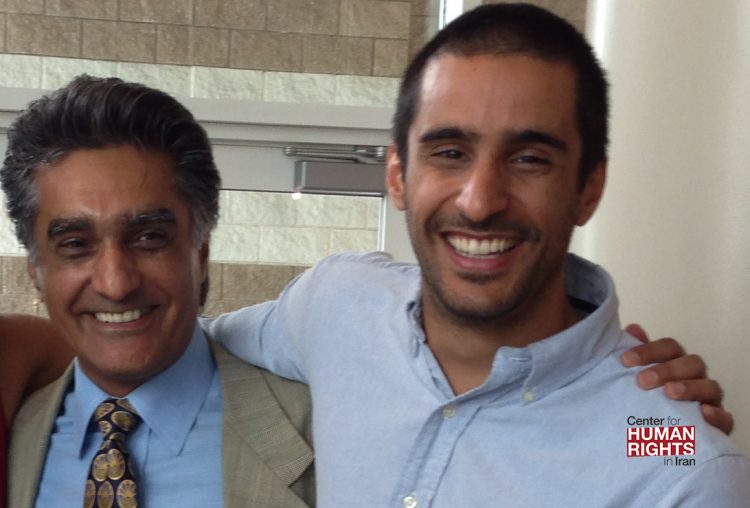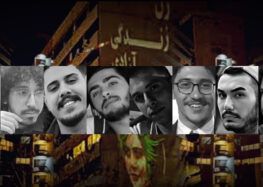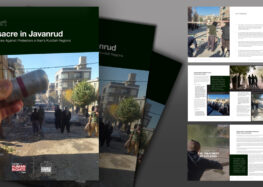Life of Iranian-American in Evin Prison is in Danger, Says Family

Karan Vafadari (left) with his son, Cyrus.
Wife and Son of Karan Vafadari Fear For His Life After Suspicious Deaths in Prison
March 1, 2018—The son of Iranian-American Karan Vafadari, who is imprisoned in Tehran’s Evin Prison, said his stepmother, Afarin Neyssari, also imprisoned in Iran, fears for her husband’s life after officials claimed without any evidence that two previous detainee deaths in January 2018 were suicides.
“Afarin said she fears for Karan’s life,” said Cyrus Vafadari, the son of Karan Vafadari, in a statement obtained by the Center for Human Rights in Iran (CHRI). “My family and I share her concerns.”
“I want to make clear that Karan Vafadari and Afarin Neyssari have no suicidal tendencies,” said the son, adding that he believes both his father and stepmother’s lives are in danger.
The statement by the son, who lives in the US, continued, “Since Dr. Kavous Seyed-Emami’s recent death in Evin Prison, I feel the need to emphasize, on the record, that at no point since Karan and Afarin’s unjust imprisonment 19 months ago have either of them shown any suicidal tendencies when we have spoken on the phone.”
Kavous Seyed-Emami, a prominent Iranian academic and environmentalist who had Canadian citizenship, died in Evin Prison allegedly by suicide on February 9, 2018. Calls by his family and UN human rights experts for an independent investigation have gone unheeded in Iran.
Cyrus Vafadari noted that his father’s brother, Kasra Vafadari, was murdered in France in 2007 “by someone with a connection to the IRGC 11 years ago,” adding that “Kasra lived under constant harassment for being a Zoroastrian.”
Karan Vafadari belongs to a prominent Zoroastrian family in Tehran. Recognized in the Iranian Constitution, followers of the ancient, pre-Islamic Zoroastrian faith have lived in Iran for thousands of years but are subject to discrimination.
Karan Vafadari and his wife, Afarin Neyssari were arrested by the Islamic Revolutionary Guard Corps’ (IRGC) Intelligence Organization at Tehran’s Imam Khomeini International airport on July 20, 2016.
In late January 2018, Branch 15 of the Revolutionary Court in Tehran, presided by Judge Abolqasem Salavati—known for his hardline views and imposition of harsh sentences in cases involving dual nationals—sentenced Vafadari to 27 years in prison and 124 lashes, and Neyssari to 16 years in prison and 74 lashes. They have also been fined more than nine billion rials ($243,000 USD).
In a February 2018 letter from Evin Prison, Vafadari wrote that before he was arrested, he was actively trying to regain some of his family’s confiscated assets through the Iranian legal system. In another letter issued that same month, he accused the IRGC of pressuring the judiciary to impose heavy sentences on him and his wife.
Vafadari was accused of a variety of charges, ranging from being a Zoroastrian dual national, “collusion in plots against national security” and “storing smuggled foreign alcohol.”
The charges against Neyssari remain unclear.
“Karan had always shown optimism that because he is innocent of any wrongdoing, he would be released when the trial came,” wrote his son in the statement. “Even after being denied his own lawyers and bail, Karan has continued to fight for justice.”
The prosecution of Karan Vafadari and Afarin Neyssari has been marked by the denial of due process, which has included being denied the counsel of their choice and forced to accept court-appointed lawyers. In addition, the authorities refused to release Afarin Neyssari after the family met the court-designated bail.
“As a family, our top priority is that Karan and Afarin are safe, and that they receive a fair trial that will lead to the only fair conclusion: their unconditional release,” he added. “They have a right to hire their own team of lawyers (which they have been denied), and they have the right to be considered for release on bail or furlough (which they have also been denied).”
“We hope that the Islamic Republic will protect its citizens, Karan and Afarin, from current rights violations and the injustices they are facing and free them now,” wrote Cyrus Vafadari.
At least 13 dual and foreign nationals and foreign permanent residents are currently being held in Iranian prisons. In November 2017, Reuters reported that at least 30 dual nationals had been arrested by the IRGC since Iran and world powers signed the nuclear deal in July 2015.
The recent multiple deaths of detainees under highly suspicious circumstances have raised concerns regarding fatal ill-treatment in Iranian prisons, particularly after swift official statements that the detainees committed “suicide” and the refusal of authorities to allow any independent investigations.
Iranian officials claimed that the deaths of Sina Ghanbari in Evin Prison on January 7, 2018, and Vahid Heydari at a detention center in the city of Arak that same month were suicides. Heydari’s lawyer, Mohammad Najafi, was arrested in February after he told media outlets that the authorities are trying to cover-up the real cause of Heydari’s death.






